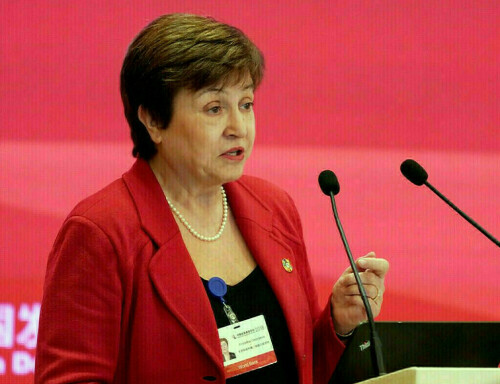Global Finance Leaders Seek Clarity on Trump’s Tariff Assault
This past week in Washington, global finance authorities gathered, aiming to discern the path to alleviating President Donald Trump’s extensive tariff measures and to gauge the potential repercussions for the global economic landscape. However, most departed with more uncertainties than resolutions.
A prevalent sentiment among attendees of the International Monetary Fund and World Bank Spring Meetings was that the Trump administration’s demands from nations impacted by its widespread tariffs remained ambiguous.
Throughout the intensive week, numerous finance and trade ministers sought discussions with US Treasury Secretary Scott Bessent and other prominent Trump administration figures, but were largely unsuccessful.
Those who did secure meetings were frequently urged to exercise patience, even as the deadline approached for the 90-day suspension Trump had granted on the most substantial levies.
Remarkably, despite the Trump administration’s claims of receiving 18 formal proposals and engaging in extensive negotiations, no definitive agreement was reached during the week.
“We are not negotiating, merely presenting and discussing the economy,” stated Polish Finance Minister Andrzej Domanski, emphasizing the detrimental impact of uncertainty on Europe and the global economy.
Warnings regarding the potential harm of tariffs—25% on US imports of vehicles, steel, and aluminum, and 10% on most other goods—to the US and other major economies were largely ignored by US officials.
Policymakers are achieving the art of the impossible, IMF chief says
“They believe it won’t be that severe,” Domanski noted. “They anticipate short-term pain leading to long-term gain. However, I fear we will experience short-term pain followed by long-term pain.”
The Trump administration’s primary trade discussions during the week involved Japan and South Korea, but outcomes remained inconclusive, with Bessent characterizing the talks as “productive.”
Specific currency targets for the Japanese yen were not addressed, but currency policies of both nations are expected to be discussed in future talks, as the US views currency weakness against the dollar as a non-tariff barrier to American exports.
The IMF adopted a slightly more optimistic outlook on the economic consequences of the elevated US tariffs, reducing growth projections for numerous countries in its World Economic Outlook, yet stopping short of forecasting recessions—even for the US and export-reliant China, which now faces US tariffs of 145% on numerous goods.
IMF Managing Director Kristalina Georgieva acknowledged member countries’ concerns about the uncertainty shock to the global economy, already challenged by the pandemic, inflation, and conflicts, but expressed hope that trade negotiations would alleviate tariff pressures.
“We recognize ongoing efforts to resolve trade disputes and mitigate uncertainty,” Georgieva told reporters.
“Uncertainty is detrimental to business, so the sooner this cloud is lifted, the better for profit, growth, and the global economy.”
Several finance officials indicated that recession risks were higher than the IMF’s 37% probability, citing private sector forecasts.
Debt Risks on the Rise
Eric LeCompte, executive director of Jubilee USA Network, a faith-based nonprofit advocating for debt relief, suggested that the IMF’s forecasts were aimed at averting market panic, even as officials privately expressed concerns about potential new debt crises.
“It was a week of inaction,” LeCompte stated, adding that debt discussions were inconclusive and overshadowed by tariff talks.
Reza Baqir, a former Pakistan central bank governor now heading sovereign debt advisory at Alvarez & Marsal, noted: “For numerous developing countries, particularly in the Global South, there is a palpable sense that the Financing for Development agenda is not prioritized.”
“And who will champion that debate?” World Bank chief economist Indermit Gill also cautioned about escalating debt levels for emerging markets, noting that tariffs had precipitated a significant slowdown in trade and foreign direct investment, essential for developing country growth.
He and other World Bank and IMF officials advised countries to lower their own tariffs to enhance growth prospects.
No US Withdrawal
Policymakers were relieved when Bessent affirmed US support for the IMF and the World Bank, emphasizing their “enduring value” but criticizing their “mission creep” into climate, gender, and equality matters.
Rather than withdrawing from the institutions, as advocated by the Project 2025 Republican policy manifesto, Bessent expressed a desire to refocus them on their core missions of economic stability and development, with expanded World Bank energy financing options and an end to China loans.
Meeting participants and financial markets were encouraged by Bessent’s earlier remarks that triple-digit US tariffs on Chinese goods were unsustainable, suggesting a potential agreement to ease them.
However, China denied Trump’s claims of ongoing tariff negotiations with Beijing, further contributing to the week’s ambiguity regarding tariffs and providing little reassurance to country delegations.
“I believe most people left anticipating a worsening economic outlook,” commented Josh Lipsky, a former IMF adviser and current senior director of the Atlantic Council’s GeoEconomics Center.
“The overall picture is quite concerning.”
A significant challenge for developed countries was the recent selloff in US Treasury debt and other dollar-based assets, signaling a decline in confidence in US economic policies, Lipsky added.
Trust in US economic leadership was the foundation of the dollar’s reserve currency status, he explained. While the US economy remains too large to ignore the dollar currently, trading partners may seek alternatives unless that trust is restored, he concluded.



Comments (0)
No comments yet. Be the first to comment!
Leave a Comment